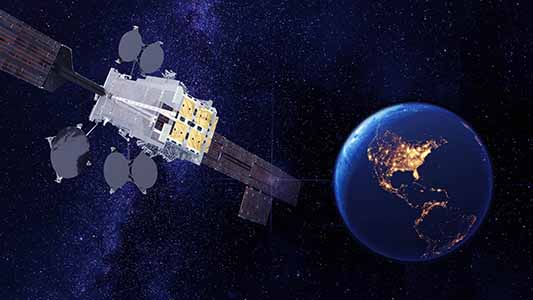The Amazonas Nexus satellite was successfully orbited by a SpaceX Falcon 9 launch vehicle from the Kennedy Space Center (KSC) in Cape Canaveral, Florida.
Amazonas Nexus belongs to Spanish satellite telecommunications operator HISPASAT. The new geostationary high-throughput satellite (HTS) will replace Amazonas 2, stationed at 61º West, affording increased capacity to enable HISPASAT to reach new customers and markets with high-capacity mobility services for the air and maritime transport sectors, among others. The advanced design, HTS capacity and versatility of Amazonas Nexus make it the most efficient satellite in HISPASAT’s fleet.
Thales Alenia Space, the joint venture between Thales (67%) and Leonardo (33%), led design, construction and testing of the satellite as prime contractor, and is in charge of its in-orbit commissioning.
A new-generation satellite for greater in-orbit flexibility
Amazonas Nexus features a new fifth-generation digital transparent processor (DTP), a technological leap essential to increase its geographic flexibility. With this new technology, the satellite’s payload will be handled digitally to match capacity to demand in orbit, giving the satellite great resilience to serve the evolving communications market, supporting connectivity, data, and content transmission.
The new satellite will cover the whole American continent, the North Atlantic corridor, and Greenland, thus strengthening HISPASAT’s position in the burgeoning air and maritime markets. The satellite’s capacity also makes it ideally suited to bridge the digital divide in Latin America, allowing governments and telecom operators to deploy networks and services in regions with low penetration of terrestrial infrastructures.
Built around Thales Alenia Space’s Spacebus NEO all-electric spacecraft bus, the satellite has an estimated lifetime of more than 15 years and a launch mass of approximately 4 metric tons. “Thales Alenia Space’s teams can be proud of the successful launch of Amazonas Nexus, a mission that will help bridge the digital divide in Latin America while bringing new connectivity services to the air and maritime sectors,” said Marc-Henri Serre, Thales Alenia Space Executive Vice President, Telecommunications. “The design of Amazonas Nexus in partnership with our customer HISPASAT illustrates the flexibility, digital agility, and robustness of our communications solutions to keep pace with the fast-moving communications market.”












